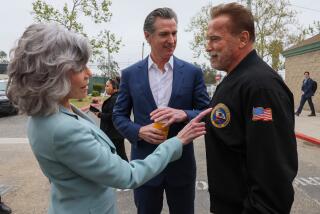In Oregon, Iraq Isn’t the Hot Issue : Politics: Rep. Denny Smith, in tough reelection fight, stresses Persian Gulf, but voters appear more interested in the environment and jobs.
- Share via
SALEM, Ore. — At the downtown Rotary Club meeting, the talk around the lunch table was of taxes and timber, not war and peace in the Persian Gulf.
“In this area, the environment is a very heavy issue, jobs are a very heavy issue,” said Salem attorney Bernard Bednarz. “I haven’t heard anybody complain about the Persian Gulf except at the gas pump; they haven’t felt it at home.”
That’s not good news for Republican Rep. Denny Smith, who faces a tough reelection fight here against Democrat Mike Kopetski, a soft-spoken former state legislator who failed to unseat Smith by only 707 votes two years ago.
Smith has tried to make his race a referendum on President Bush’s tough response to Iraq, even accusing Kopetski of preferring to “appease” Iraqi President Saddam Hussein. But the consensus among several businessmen and women who discussed the campaign with a visitor at the Rotary Club luncheon last week was that Smith’s attacks had failed to wound the challenger and may have even backfired, an assessment shared by other local observers.
“I have not gotten one letter of support for Smith on this subject or one letter criticizing Kopetski,” said Robert Landauer, editorial page editor of the Portland Oregonian. “I have got nothing but letters of criticism of Denny Smith.”
That response may be unusually intense, but it generally follows the pattern in the handful of other races where candidates have sparred about the commitment of U.S. forces to Saudi Arabia.
Though the Persian Gulf standoff has dominated the news and revived debates about defense spending and energy policy, only a few candidates have directly questioned Bush’s military response. But even where candidates have voiced doubts--as in this otherwise tranquil corner of the Willamette Valley--voters have resisted efforts by those candidates’ opponents to make the objections a campaign issue.
Disputes over the military commitment have also erupted in the Iowa and Nebraska Senate races. But in neither contest is it currently a decisive, or even dominant, issue.
“People are very cynical about politicians right now and the people who are making the most outlandish (charges) are being hurt the most,” said Democratic pollster Harrison Hickman, who is advising Sen. J. James Exon (D-Neb.), in his reelection bid. “They not only hold politicians responsible for what they say but they grade them down if they try to take advantage of something like this.”
No candidate has sought advantage on the issue more aggressively than Smith, a former Air Force pilot who leans to the right in Congress and leads with his right in campaigns.
Since mid-August, Smith has slammed Kopetski for his comments before a small group of supporters on the night Iraq invaded Kuwait. At that Aug. 2 fund-raiser, Kopetski said he wanted the United States to work through the United Nations rather than intervene unilaterally and then declared, somewhat vaguely, that he hoped “this action isn’t going to go any further than Kuwait . . . . “
When the remarks were reported in the Silverton Appeal-Tribune last month, Smith accused Kopetski of “cozying up to Saddam Hussein” and of pursuing a policy of “appeasement.” Smith then escalated the hostilities with radio ads that featured menacing recordings from an Adolf Hitler speech and tried to paint Kopetski as the Neville Chamberlain of the Northwest.
After Kopetski accused Smith of misrepresenting his position, the congressman bought five minutes of Portland television time on Sept. 12 to air a videotape--taken by a reporter at the fund-raiser--that showed Kopetski saying what the Silverton paper quoted.
“We ran it and we got lots of calls where people were saying, ‘I’m shocked that this guy said this,”’ said Smith in an interview. Kopetski acknowledges that the dispute over his remarks has forced him to “spend the past three or four weeks playing defense.”
But in the local press of this unusually diverse district--which encompasses everything from wealthy Portland suburbs to this quiet capital city to farming and timber towns--Smith’s use of Hitler in his ad has drawn more criticism than Kopetski’s remarks. Even Smith’s supporters now are anxious to see the campaign move on to other subjects.
“I wish both of them would get back on issues,” said Republican State Sen. Gene Derfler, who narrated the Smith television ad that showed the videotape. “That’s what people want to hear more about than Iraq.”
To a considerable extent, the issue’s political voltage has been diminished here because Kopetski--like such other critics as Exon and Sen. Tom Harkin (D-Iowa)--has dissented only mildly from the President’s policy.
Since his initial comments, Kopetski has repeatedly stressed his support for Bush’s overall response--which, in the end, relied on U.N. sanctions rather than unilateral confrontation. “I think he has done a masterful job,” Kopetski told high school students last week. Now, Kopetski chides Bush only for vacationing during the deployment and says that Congress should also have returned to hold a special session on the crisis.
Even before the two contenders clashed over the Persian Gulf, the race had been a petri dish for the themes of the 1990 election. Like other challengers in both parties, Kopetski has focused most of his fire on the incumbent’s role in the savings and loan scandal.
Last week, the Democratic Congressional Campaign Committee filed a complaint against Smith with the House Committee on Standards of Official Conduct that accused him of violating congressional rules by lobbying federal regulators “for a softening of . . . policies against directors of failed savings and loan institutions” while he sat on the board of the failing American Federal Savings & Loan of Salem.
Meanwhile, Smith--who has dismissed the ethics complaint as “cynical and underhanded”--has run a prototype Republican “wedge” campaign, portraying Kopetski as a big spender who is soft on defense and crime and too sympathetic to environmentalists in the bitter dispute over logging in the state’s old growth forests.
In such a polarized environment, no truce is likely in the war of words over the Gulf. But, as stalemate supplants crisis in the headlines from the Middle East, the issue appears to be fading into the mist of events for voters here. Unless the region explodes before Election Day, local observers say, this closely fought congressional race will be decided by concerns closer to home.
More to Read
Sign up for Essential California
The most important California stories and recommendations in your inbox every morning.
You may occasionally receive promotional content from the Los Angeles Times.












